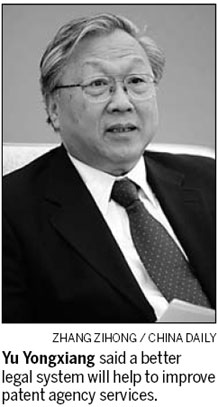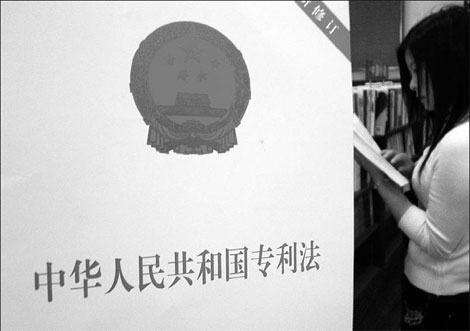Patent agency services a 'weak link' in system
|
In published form: The nation's patent law has been amended three times since it first took effect in 1985. Ren Weihong / China daily |
Standing Committee member: 'Fair competitive environment' needed
Chinese patent agency services are still a weak link in the innovation system, according to Lu Yongxiang, vice-chairman of the Standing Committee of the National People's Congress.
As part of the patent system, agencies work in a wide range of legal services from applications, examinations and granting of patents to litigation. More than 6,000 agents are now working in the industry in China.
A shortage of highly trained and professional patent agents is a common concern for business and research institutions, Lu said.
"A better legal system will help to create a fair competitive environment with good faith, improve patent agency services and build an innovation-oriented country," he stressed.
The vice-chairman made the speech at a meeting held in Beijing last Thursday to celebrate the 25th anniversary of China's Patent Law.
Echoing Lu's opinion, Commissioner of the State Intellectual Property Office Tian Lipu said regulations on patent work released nearly 20 years ago do not satisfy current requirements and need to be improved.
The State Council has already listed amendment of the regulations on its legislative agenda for this year.
The commissioner said that his department will gear up its preparatory work for the amendment and hopes the legislation can take effect as soon as possible.
Vice-chairman Lu said intellectual property protection plays a crucial role in encouraging technological innovation and serving the nation's long-term interests and overall development.
The Patent Law, which came into effect in 1985, marked "a new chapter of China's intellectual property system construction" and showed the nation's determination to advance opening-up policies and protect intellectual property, Lu said.
Release of a national intellectual property strategy in 2008 was another milestone marking a new stage in China's approach to intellectual property, he noted.
"Building an innovation-friendly market, developing a market-driven technological innovation system and maintaining market order and a legal environment are all key to implementing the national strategy," he said.
Commissioner Tian said that China has signed a string of international patent agreements over the past 25 years and included treaty principles in domestic legislation.
China has risen to be the fifth-largest source of international patents, with nearly 8,000 international applications in 2009 alone - more than 77 times that of 16 years ago.

"At the same time, public awareness about respecting and protecting patents has increased significantly," Tian said. "Innovation and creation by companies and research institutions have a new lease on life."
By the end February, the all-time number of patent applications filed in the country surpassed 5.9 million. More than a half of them have been granted.
China Aluminum Vice-Manager Ao Hong said that the nation's largest aluminum maker values intellectual property as its key strategic resource. The State-owned company applied for nearly 1,200 patents last year.
Huawei Vice-President Song Liuping said continuing investment in research and development - equal to more than 10 percent of the company's annual revenue - is key to growth in the Shen-based technologically intensive company.
With overseas markets contributing 70 percent of its more than $30 billion in revenues last year, the telecommunication giant offers an edge in patented technologies as its core competitiveness. It also widely uses and offers cross-licensed patents.
Growth of the private company founded in 1988 benefited enormously from the Patent Law and progress in intellectual property protection, Song said.
She Ruizhi from IBM said the foreign-invested tech giant pursues an open-minded and transparent attitude in intellectual property and calls for a balance between encouraging technological innovation and protecting the public's interests.
China Daily
(China Daily 04/07/2010 page17)









